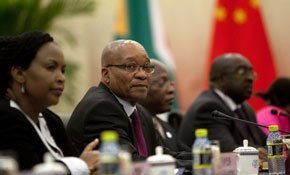History is full of pivotal moments when a decision one way or the other has sent events in a dramatically different direction.
How would Europe have developed during the 19th century had Napoleon not decided to invade Russia? What would have happened if the victorious allies had not imposed such a crippling peace treaty on the Germans at Versailles after the First Word War? How would the world look today if a hardliner - instead of Mikhail Gorbachev - had succeeded to the leadership of the Soviet Union in the early 80s?
This is interesting speculation - but it is all water under the historical bridge. It is much more important to identify the pivotal issues that confront us today and to ensure that those involved take the right decisions now.
Such a pivotal situation is now developing in South Africa. The country is balanced between success and failure. If the forces of history come down on the success side we can look forward to a positive future in which our young democracy will be consolidated; economic growth will accelerate; and we shall continue to set an example for peaceful and harmonious relations in our intensely multicultural nation. Should this happen benefits would accrue to the whole of Africa. We would continue to set an example to rest of the continent on the need for sound economic and constitutional governance. Our economy would continue to act as a powerful locomotive that would help to pull all of southern Africa toward first-world prosperity. We would also continue to show conflicted societies throughout the world that rational negotiated settlements work; that endless conflict is not inevitable; that even the most intractable problems can be solved by peaceful means.
However, if the balance tips the other way the consequences for South Africa, for Africa and the world could be commensurately dire. If South Africa - with all its advantages - fails, there will be reverberations throughout the continent. Prospects for Africa’s emergence into the mainstream of human development will receive a serious - and perhaps a fatal - blow. The world would have to face the stark implications of having to deal not only with the consequences of a failed state, but possibly of a failed continent. Everywhere - and particularly in the Middle East - the long-term viability of negotiated solutions would be seriously undermined.
The fulcrum on which South Africa’s future will pivot is our Constitution. It is a carefully balanced document that represents an historic compromise between all the significant sectors of our society. It makes provision for a fully democratic society; it is based on the rule of law; it protects the fundamental rights of all our citizens; it envisages a society based on equality and human dignity. If we can maintain this excellent Constitution I am confident that our future will be secure. However, if present tendencies to erode the Constitution are not effectively checked, then the balance will swing inexorably toward failure.
The main force seeking to disturb the balance is the ANC’s National Democratic Revolution. In terms of the ANC’s guiding ideology the constitutional agreements that we reached prior to our first universal democratic election in 1994 did not constitute the culmination of the liberation struggle - but were only a milestone on the line of march to the ultimate goal of the revolution. As a result, the ANC retains its historic mandate as the ‘national liberation movement’ - with a status far above that of an ordinary political party. (This is one of the reasons why it refuses to characterise itself as a political party and why it has been so reluctant to criticise President Mugabe, the leader of another NLM, in his opposition to the MDC which is a mere political party.) The NDR’s ultimate goal is what the ANC calls a ‘non-racial democracy’ - in which all aspects of control, ownership, management and employment in the state, private and non-governmental sectors will be required to mirror the demographic composition of South Africa’s population. Like the communist ideal of the ‘classless society’, the non-racial democracy has a superficial appeal: however, closer examination reveals that it would simply result in racial domination (what the ANC calls African hegemony) in every facet of the government, society and the economy. The NDR would require massive and forced redistribution of property and wealth from the white minority to the black majority and the disemployment of most white South Africans. The achievement of NDR’s goals would end any prospect for racial harmony in South Africa and would lead to spiralling conflict; the emigration of millions of South Africans with indispensible skills and the collapse of Africa’s largest and most sophisticated economy.
The main impediments to the erosion of the Constitution lie in the genuine support for its principles that still exists in some ANC circles; in the Government’s reluctance to alienate international opinion and foreign investors by breaching global governance and economic policy norms; and, finally, in the opposition of South Africa’s free media, civil society institutions and opposition parties.
The media and civil society have an impressive track record in defence of the Constitution: in 2006 they persuaded the Mbeki presidency to withdraw the Constitution 14th Amendment Bill that would have seriously undermined the independence of the judiciary; in 2008 their actions led the government to shelve an expropriation bill that would have made it possible for government to expropriate property without payment of court-approved compensation; currently, civil society and the media are combating the Protection of Information Bill and proposals for a Media Appeals Tribunal that would threaten the freedom of the press and the ability of the media to report on government corruption and wrong-doing. Civil society and the media are now bracing themselves to oppose a raft of labour laws that will further restrict the labour market and lead to the loss of at least 1.5 million jobs - as well as new land reform measures that would put an end to the concept of freehold property rights. All this is taking place at a time when the ANC Youth League is calling ever more volubly for the nationalisation without compensation of the mines, the banks and the commanding heights of the economy.
The media, civil society and opposition parties have so far succeeded quite well in holding the line in defence of the Constitution. However, they will need all the support they can get from people of goodwill inside South Africa and in the international community to continue to play this role. This might well be one of those pivotal points in history when the right decisions by governments and people of goodwill could lead to positive outcomes - and where the wrong decisions - or more likely no decisions at all - could have very negative consequences - for the people of South Africa, for Africa and for the world.









